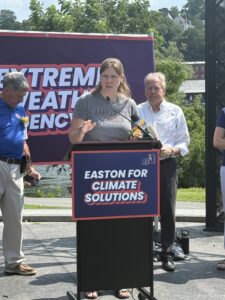In the media: Prof. Christa Kelleher joins Easton news conference to bring attention to extreme weather
Christa Kelleher ’08, assistant professor of civil and environmental engineering and Kate and Walter A. Scott ’59 Scholar in Engineering, lent her expertise as a hydrologist in support of a news conference on July 24 that brought attention to the increasing threat of flooding and severe storms in Easton and the Lehigh Valley region and the need to protect federal weather and climate infrastructure.

Prof. Christa Kelleher speaks at extreme weather press conference.
Kelleher was joined by state Rep. Robert Freeman (D-Northampton), Rachel Hogan Carr, executive director of the Nurture Nature Center, and others at Easton’s Scott Park, which overlooks the Lehigh and Delaware rivers, for the Climate Action Campaign’s Extreme Weather Emergency Tour media event.
Kelleher said she teaches her Lafayette students that flooding is an expected, natural process but noted that the warming climate is making extreme events like flooding, droughts, and hurricanes even worse.
“Here in the northeast, one of the strongest climate change signals we see is that extreme precipitation events are increasing in size,” she said. “Over the last few decades, our biggest storms have been getting bigger. These storms will continue to grow in the future.”
These larger storms, combined with even greater impervious surface cover, mean that an event that might have been a 100-year flood a decade or two ago is now a 500-year flood or a 1,000-year flood, all of it costing more in terms of dollars and lives.
“What is most worrying to me about our current moment is that the things we need to combat flooding – more data, more experts, more warning systems, and greater funding for resilient infrastructure – are being taken away from us,” Kelleher said.
“I cannot stress to you enough how worrying it is that we are seeing the defunding of federal agencies that help us respond to extreme events, and the removal of clean air protections, which has direct implications for pollution and climate change,” she said. “As an expert, this makes me nervous, for the U.S. as a whole and for the Lehigh Valley.”
Flooding, hurricanes, and drought are the new normal for the region, and that can’t be changed, Kelleher said.
“Instead, the part we do have control over is what we choose to do about it and what we advocate for. We need sustained investment in local infrastructure – including green and grey infrastructure, and the protection of wetlands,” she added. “We must demand change, because increasing our resilience to extreme events is something that will impact all our lives – now and into the future.”
Several Lehigh Valley media outlets reported on the event, including lehighvalleylive, LehighValley News.com, and The Morning Call (subscription required to access article).